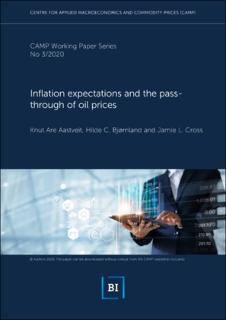| dc.contributor.author | Aastveit, Knut Are | |
| dc.contributor.author | Bjørnland, Hilde Christiane | |
| dc.contributor.author | Cross, Jamie L. | |
| dc.date.accessioned | 2020-06-29T21:33:34Z | |
| dc.date.available | 2020-06-29T21:33:34Z | |
| dc.date.issued | 2020-06-25 | |
| dc.identifier.issn | 1892-2198 | |
| dc.identifier.uri | https://hdl.handle.net/11250/2659927 | |
| dc.description.abstract | Do inflation expectations and the associated pass-though of oil price shocks depend on demand and supply conditions underlying the global market for crude oil? We answer this question with a novel structural vector autoregressive model of the global oil market that jointly identifies transmissions of oil demand and supply shocks through the real price of oil to both expected and realized inflation. Our main insight is that US households form their expectations of inflation differently when faced with long sustained increases in the price of oil, such as the early millennium oil price surge of 2003 to 2008, as compared to short and sharp price fluctuations that characterized much of the twentieth century. We also find that oil demand and supply shocks can explain a large proportion of expected and realized inflation dynamics during multiple periods of economic significance, and resolve disagreements around the role of oil prices in explaining the missing deflation puzzle of the Great Recession. | en_US |
| dc.language.iso | eng | en_US |
| dc.publisher | BI Norwegian Business School | en_US |
| dc.relation.ispartofseries | CAMP Working Paper Series;03/2020 | |
| dc.subject | Inflation expectations | en_US |
| dc.subject | Inflation pass-through | en_US |
| dc.subject | oil prices | en_US |
| dc.title | Inflation expectations and the pass-through of oil prices | en_US |
| dc.type | Working paper | en_US |
| dc.source.pagenumber | 34 | en_US |
| cristin.fulltext | | |
